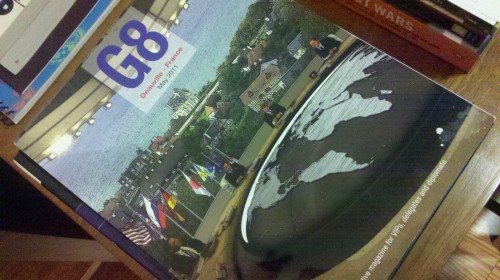….now that calls to leave will likely increase exponentially?
(Update: I don’t think I was very clear in this post when I wrote, “there is a state vision and a state plan to carry out that vision.” I did not mean complicity or duplicity or anything like that. The point I am trying to make is that the regular use of non-state actors as an instrument of internal power-politics or foreign policy is dangerous and should not be excused).
Security analyst Rory Medcalf from the Lowy Institute says parts of Pakistan’s security establishment were either aware of his location or were harbouring him.
.
Mr Medcalf says in continuing to support Pakistan, the international community risks more of the same treatment.
.
He says Australia should consider withdrawing support for Pakistan’s military and instead build up its police force and civil society institutions.
– from the news article, “Australia urged to rethink Pakistan military aid.”
I don’t know about Australia, but the United States has had every possible type of diplomatic and military relationship with Pakistan – we’ve developed and trained parts of its military (and this from the beginning. The UK, too.), stuffed it to the gills with military aid, provided money intended for education of its civilian population which was then squandered and looted, prevented India from retaliating against terror attacks emanating from the region, attempted to cut aid during the time of the Pressler Amendment, and “walked away” from Pakistan during the 90s:
Of course, Pakistan’s complaints are not entirely unfounded: the United States did abandon the region once the Soviets withdrew from Afghanistan in 1989. Pakistanis, however, never acknowledge the enormous benefits that the country derived from its partnership with the Americans during the 1980s. Between 1979 and 1989 Pakistan received $5.6 billion (in constant 2009 dollars) in total aid, of which $3.5 billion was military assistance.) During this period, Pakistan developed its nuclear weapons program without penalty until 1990 while receiving enormous financial and military support from the U.S., which allowed Pakistan to improve its capabilities to fight India.
.
Most frustrating is Pakistan’s refusal to acknowledge its own role in undermining its security by backing various Islamist militant groups in Afghanistan throughout the 1990s, including the Taliban. (Pakistanis often claim erroneously that the CIA created the Taliban.)
– C. Christine Fair in Foreign Policy
So engagement hasn’t worked and disengagement hasn’t worked, either.
My initial read is that the American political and policy community is utterly confused – and a bit terrified. Over the years it has lied to itself and to the American people over the true nature of the regime running Pakistan. There are no rogue elements, unless you want to count the true democracy activists and human rights activists. It is a state expressly set up for the benefit of the feudals and the military and to allow non-state actors to develop so-called asymmetric capabilities. And the West provided intellectual cover for many years, initially because of its existential war with the Soviets. This initial engagement morphed and mission-creeped in various ways: poking back at the Soviet-friendly Indians, opening up relations with China, attempting to leverage Pakistan within the context of the Saudis and Iran (and now, again, a “different” China), “help” with Afghanistan, and so on and so forth. One of the reasons solving Kashmir became a US State department hobby-horse – and a standard of the DC think tank community – is because we were trying to placate a NATO member (the UK) that has its own problems with radicalization and a large immigrant population from Pakistan-administered Kashmir.
The United States won’t cut aid even though aid has been misused and propped up the most corrupt elements of the state. Aid is fungible and it has traditionally made things worse, not better. Money spent on the civil sector (or to train the police) means more money for the military and ISI. We are afraid, however, of the very nuclear weapons that the West’s money – and Chinese and Saudi aid – has helped to purchase ending up in terrorist hands or being gifted to the Saudis. And we still need to hunt down more people in that region and will pay almost any bribe to do it.
So here we are: “Know your enemy and know yourself and you can fight a hundred battles without disaster.” – Sun Tzu.
A theory: Our foreign policy community is confused within the context of “Afpak” because our traditional DC foreign policy mandarins never came to terms with the repercussions of fighting tyranny in one part of the globe by explicitly ignoring versions of it in another. I mean, in terms of what this does to your own institutions long-term, what it does to your military and State department bureaucracies, and to think tanks and a generation of South Asia analysts. In this, our attempts to nation-build in Afghanistan are highly laudable but unworkable (witness the recent furor over the allegations regarding Greg Mortenson’s “Three Cups of Tea” charity). Yes, yes, I know that sometimes you have to hold your nose and work with people you don’t want to for a greater good and that greater good is continuing some version of our counterterrorism or counterinsurgency work within the region. But you shouldn’t lie to yourself or lie to the people you are meant to serve. It’s time for Washington to face facts. There are no rogue elements. There is a state vision and a state plan to carry out that vision.
To those who say, “well, we never really supported the civil sector in Pakistan in the past”: How do you do that effectively when the military colonizes the economy? When it owns large tracts of land and businesses? Once again, aid is fungible and the State department and its Western development theories (building civilian governmental capacities; in other words, social engineering abroad) has a rocky track record, at best. So now what?
What say you?
